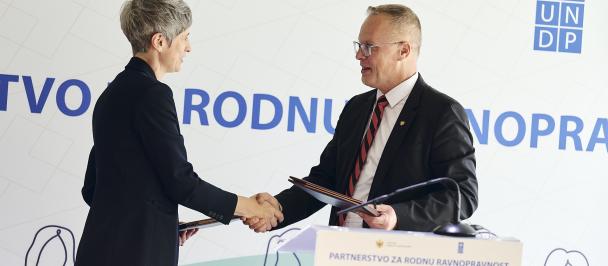Gender through culture lenses
November 4, 2022

Scene from the "Lepota poroka" movie
Culture as the most creative and vivid field was always perceived as an area which is able to boost public awareness on important policies and activities. Its role and potentials have been fully expanded in the period of lock-down caused by pandemic of COVID 19, when despite physical and in some cases social isolation, culture reached every single individual, bringing cultural contents into homes and lives of people. Expansion of social networks and digitalization have additionally broadened culture’s potentials in transforming social patterns and shaping desirable attitudes towards respect of human’s rights.
Women’s rights, as part of human rights, represent one of key priority area through which UNDP CO Montenegro sets standards and drives necessary social change. In previous cycle many efforts have been invested in prevention of the violence against women. Besides policy change and enhancing of the capacities of the institutions to adequately address and prevent this form of violence, it was realized that roots of any form of violence against women has been seeded in traditional patterns and patriarchal context of Montenegrin society. It has become clear that in order to change these narratives and challenge machoistic social norms, the focus should be directed towards everyday life and social and cultural values that Montenegrin society cherishes.
Following that development, UNDP CO Montenegro has strategically set several important goals in the field of culture, with the purpose to raise awareness of importance of gender equality through culture lenses. Having in mind importance of culture in everyday life and its ability to easily adapt to different circumstance, UNDP CO Montenegro has developed several important programmes which were aimed at targeting wider audience with specific cultural products designed specifically for different target groups.
Academic research and analyses
In order to understand where these questionable gender patterns lie and how they have been (re)stored for long period of time, it was necessary to conduct specialist’s research on gender perspective within artistic and expert community of Montenegro. The results which have been recently published have revealed that even in cultural institutions and people working in the field of culture are faced with gender-based stereotypes and prejudices.
The author of the research, PhD Maja Bogojević, has discovered some captivating facts such as that more than 81% women interviewed within her research, which are all working in the field of culture, considers that women are underrepresented in culture and that there is obvious need for more solidarity among women in the field of culture in Montenegro. Bogojević has also revealed that even 90% of interviewed women working in film and theatre agrees that professionalism in these areas is gender conditioned, while 91% of actresses testify about examples of false promises, impossible demands, sadism of the powerful of men, humiliating treatment, derogatory comments for actresses, obsession with their appearances etc.

Cover page of the Study
More interesting data which can ease understanding of cultural context of Montenegro through gender perspective can be found in the publication Study on gender aspects of cultural contents in Montenegro.
Awareness raising
Understanding that change of social patterns is not possible without wider engagement of overall society, and being aware that Montenegrin society rests on foundations which were built not only by men, but also by outstanding women whose activism has shaped history of this area throughout centuries, UNDP CO Montenegro has gladly supported monography Women of Montenegro, designed and written by group of authors, and also supported by the Delegation of European Union in Montenegro, Ministry of Human and Minority Rights, City of Podgorica and City library “Radosav Ljumović”. On most engaging way and with interesting design, this monography present 65 outstanding women of Montenegro whose participation in national liberation struggle, activism, and work in the areas of politics, human rights, education, culture or sports, has secured women’s right to vote, right to participate in decision making, to be political leaders and have equal rights as men nowadays.

Women of Montenegro - illustrations from the Monography
Having in mind that publication Women of Montenegro is not meant for selling and being aware that these kinds of cultural products could be valorised in numerous ways, UNDP CO Montenegro with the support of the partners, has launched specific project – creation of short video narratives for all women who have found their places in this publication. First 20 videos have already been launched and broadcasted, while the preparation activities for the next 20 have been already undertaken.
Special partner on this project activity was Public Broadcaster of Montenegro RTCG, which accepted to broadcast one of these videos every day in primetime – just before the most watched TV news at 19.30. This fact has provided enormous outreach of these cultural contents which will hopefully have impacts on changing social norms towards more respect of women’s rights all over Montenegro.
Pop culture
Being aware that digitalized word brings new, innovative media forms which in many cases have bigger reach and wider social influence, CO Montenegro has developed specific project idea, which was designed and implemented in 2021, specifically targeting younger generations: Podcast “G spot”. The podcast was developed as an interactive activity which has questioned gender-based stereotypes, positions of women nowadays and respect of women’s rights. Every episode of the podcast had hosted three different guests from diverse backgrounds but who are prominent figures in their areas: culture, media, academia, sports, activism.
The episodes were broadcasted via Public Broadcaster of Montenegro RTCG several times already and also via Radio Krš – first radio for youth and students of Montenegro – the feedback was immense, which was of the utmost importance for planning of similar activities in near future.
This exploring adventure of influence and interconnection of media, communications, and culture on achieving gender equality was possible to conduct through the project “Communicating gender equality”, financed by the European Union and implemented by UNDP in Montenegro.

 Locations
Locations



